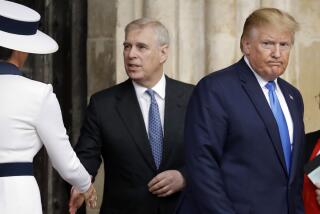Jury Hears Tapes in Princeton/Newport Racketeering Trial
- Share via
NEW YORK — As closing arguments began Monday in the racketeering and securities fraud trial of executives of Princeton/Newport Limited Partners, a federal prosecutor replayed excerpts of taped telephone conversations that he asserted proved that the defendants in the case knew that they were committing crimes.
Assistant U.S. Atty. Neil Cartusciello concluded that the evidence produced during the monthlong trial proved that the small securities partnership had a “reciprocal” arrangement with Drexel Burnham Lambert Inc. under which the two firms illegally “parked” blocks of stocks and bonds for each other.
“These transactions were indeed rigged,” Cartusciello told jurors. “It was all part of a reciprocal deal. . . . You park my stocks, I’ll park your stocks. You park my bonds, I’ll park your bonds.”
But Theodore Wells, the lawyer for defendant James Sutton Regan, the managing general partner of Princeton/Newport, asserted that the activities that the government claims were illegal actually were part of what Regan and others believed at the time was legitimate tax planning. He said the Princeton/Newport defendants didn’t profit from the allegedly illegal actions and never intended to commit a crime.
Racketeering Charged
In addition to Regan, the other defendants in the case are Charles M. Zarzecki, Princeton/Newport’s head trader; Steven B. Smotrich, the firm’s controller; two general partners, Jack Z. Rabinowitz and Paul A. Berkman, and former Drexel trader Bruce Lee Newberg. Newberg is also a defendant in the pending criminal case against former Drexel junk bond chief Michael Milken.
Princeton/Newport, which was based in Newport Beach and Princeton, N.J., went out of business after the indictment against the partnership officials and Newberg was filed a year ago.
The Princeton/Newport indictment charges the six individuals with engaging in a pattern of racketeering activity by arranging phony trades of stocks and bonds in 1984 and 1985 so that the partnership could claim false tax losses and false long-term capital gains. Such arrangements, under which one firm temporarily holds securities and hides their true ownership, agreeing to return them at a fixed price unrelated to their market price, is known as “parking.”
The six are also accused of illegally manipulating the market price of stock in COMB Co. in 1985, allegedly at Newberg’s request. COMB at the time was was a client of Drexel’s.
Taped Conversations
Much of the case hinged on tape recordings seized by federal agents when, armed with a search warrant, they raided Princeton/Newport’s New Jersey offices last year. Princeton/Newport routinely taped phone conversations so that the firm could later verify the accuracy of trades.
On Monday, Cartusciello replayed tape excerpts for jurors, including a conversation between Berkman and former Drexel trader Cary Maultasch, in which Berkman asked Maultasch to sell a series of bonds at “the lower the price, the better.” Cartusciello argued that this would only have made sense if Princeton/Newport was selling the bonds with the intention of creating a phony tax loss and immediately repurchasing them.
He also played a tape in which Regan and Newberg appeared to be arguing over the amounts of money owed for securities that they had parked for each other.
Closing arguments by defense lawyers are expected to continue today, and the case probably won’t go to the jury until the end of the week. The trial has subjected jurors to some of the most arcane Wall Street terminology ever used in a criminal trial. The jurors have been asked to master such terms as “tax straddles,” “naked short positions” and “wash sales.”
In addition to parking securities at Drexel, the Princeton/Newport defendants are also accused of illegally parking securities at Merrill Lynch. Wells argued that the defendants had a reason to believe that their actions were legal because the compliance departments at both Drexel and Merrill Lynch approved the transactions.
Merrill Lynch hasn’t been charged with any violations. Rudolph W. Giuliani, the U.S. Attorney in Manhattan at the time that the Princeton/Newport charges were filed, has said no action was taken against Merrill Lynch because the firm cooperated fully in the investigation. In August, Drexel is expected to plead guilty to several charges, including a count related to its dealings with Princeton/Newport.
More to Read
Inside the business of entertainment
The Wide Shot brings you news, analysis and insights on everything from streaming wars to production — and what it all means for the future.
You may occasionally receive promotional content from the Los Angeles Times.










